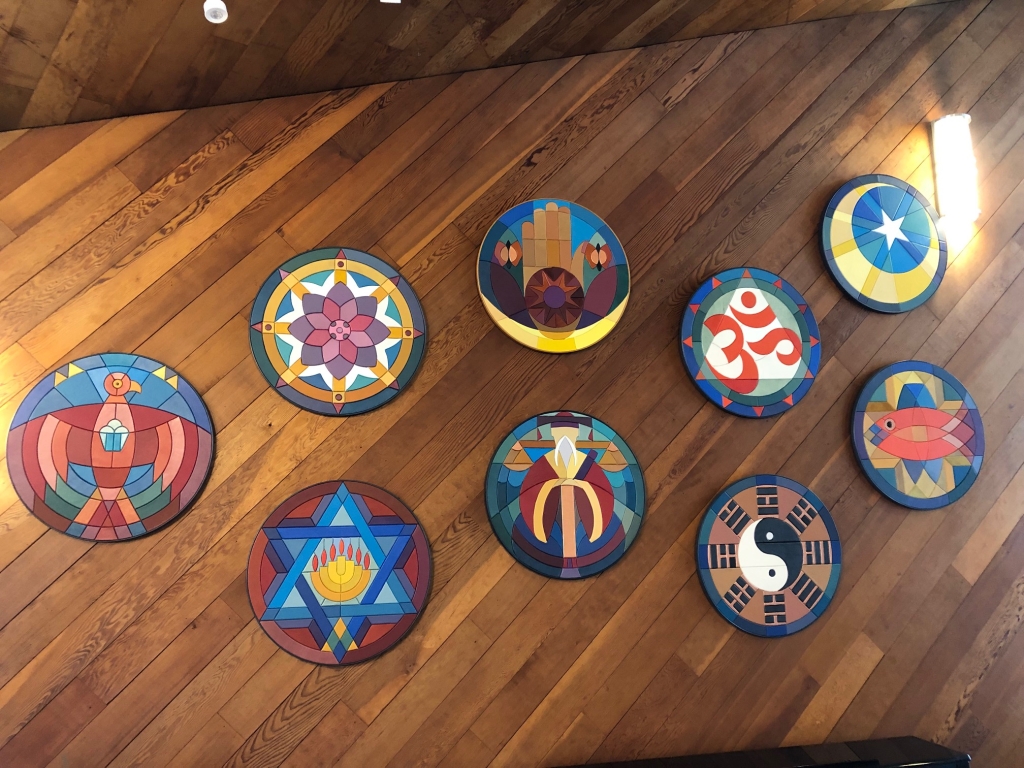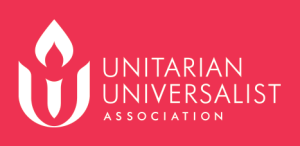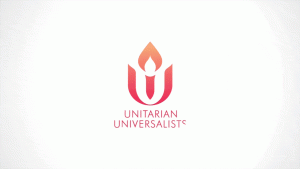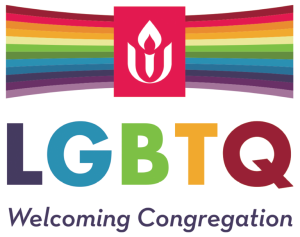The fourth principle: A free and responsible search for truth and meaning

An interview with the Rev. Dr. Laurie Proctor, minister emerita of our congregation. She served from 1991 to 2003.
Laurie, like most Unitarian Universalists, you came to our faith as an adult from a different tradition. What role did the principle of a free and responsible search for truth and meaning play in that transition?
This takes me back to my college days. I was baptized at age seven in the Roman Catholic Church. The fact that I wasn’t baptized earlier was a consequence of my parents’ desire that I find my own religious truth. Ignored in this was that at that young age, I was less influenced by my own search and more influenced by my best friend who had taken me to mass and catechism classes. Years later, my mother, who had grown up Catholic, confessed that she never would have let me be baptized in any other tradition.
The Catholic church became my home for the next 14 years. It gave me a place to be and an identity. Looking back on that time, I puzzle over how deeply I accepted the beliefs of Christianity, which required a suspension of rational thought. Even as child, I was pretty rational — most of the time, at least. I loved learning, being exposed to new ideas, thinking, and as I grew into my teen years, having very deep discussions about life. It was the late ‘50s and early ‘60s and there were lots of ideas floating around.
As a Catholic, one is supposed to accept certain beliefs; the church would call them truths. I wasn’t always good at this. I remember a discussion with my mother about papal infallibility. My claim was that the pope was just a man, and no human is infallible; my mother said that to be a good Catholic meant accepting that he was always right. I knew she was probably correct, and I lived with the tension.
In recent months, in these days of mob mentality, I have again been thinking about the challenge of standing up to a crowd. An incident in my religious past came to mind. One Sunday each year, Catholics were asked to take the pledge to the Legion of Decency, which decided what movies it was okay for RCs to see. We had to stand during mass and say it aloud. I had always done it, but one of those Sundays I happened to be sitting with a high school friend and her family. Nicole didn’t stand or say it because she didn’t believe in it. I didn’t believe in it either, but I didn’t realize you could do that, although as a good Catholic, I should have believed in it. In any case, I never said the pledge again.
Looking back, questioning beliefs was my own way of searching for the truth, but at the time, I didn’t know where to go with it, especially living in time and a place where Christianity was dominant. Differences were in what seemed like the details. It was not until I was in my third year of college that I began questioning the big picture and that took me out of the Roman Catholic Church and into Unitarian Universalism.
While a student at what is now San Jose State University, I attended a small church that was home to farmworkers living in the area. The priest was the kind of priest I liked, preaching on social justice issues, saying you couldn’t be a good Catholic if you didn’t live your religion all the time, not just at mass. At the time, there was a question on the ballot about the repeal of a fair housing law. This priest spoke against the law’s repeal.
It was a nasty fight and moral voices were much needed. However, when I attended my home church, there was silence. Only when the archbishop sent out a letter that had to be read in church was the issue raised. At Thanksgiving that year, after the voters had repealed the law, my uncle said, “I’ve got what I got, and no (N-word) is coming into my bedroom and taking it.” At that point, I saw very clearly how one could be a so-called good Catholic and at the same time be unaffected by what I then saw as the teachings of Jesus.
That disaffection became more general. I became a VISTA Volunteer in West Virginia that next year. I attended mass once with a visiting friend and realized that I could not say the Apostles’ Creed because I didn’t believe it anymore. My search for truth had taken me permanently out of the Catholic Church and into the Unitarian Universalist fellowship down the street from where I lived.
After you were ordained, how did the fourth principle help guide your ministry?
As a minister I was privileged to write about 40 sermons every year. I say “privileged” even though I often could be found tearing my hair out doing the writing. In other traditions, the Sunday themes are set out in a lectionary, but as Unitarian Universalists we don’t have this. While we joke that we follow the Hallmark calendar, the reality is that we have a great deal of freedom in choosing themes for worship. This is challenging, and at times, very difficult, but it opens possibilities.
Not only was I continually engaged in this search for truth and meaning in choosing topics, but then I had to engage each topic in a sermon. This is where I felt especially fortunate as a minister. Even though I could be frustrated because there was never enough time to do the research I wanted to do, there was always opportunity for learning.
I am called/was called to do a “responsible” search for truth and meaning, but responsible to whom or what? I am responsible to the ministry, to our tradition of the free pulpit, to preach the truth as I best understand it. I am responsible to the congregation, to their needs, to their future especially. I am responsible to the Earth and our universe, the interdependent web. And I am responsible to myself, to live and to preach truth that I can live with.
One of the themes in Unitarian Universalism is that truth is always being discovered by human effort. How do you explain that idea to people who might expect a religious organization to proclaim a revealed and unchanging truth?
Living here in Fort Wayne, which is a hotbed of Missouri Synod Lutheranism, offered opportunities to speak to such young people, many of whom believed their revealed truth to be unchanging. In particular, I am thinking of two different classes, one at Concordia Lutheran High School and another at South Side. The Concordia class was one on World Religions, which amused me because they saw us as very other. I just told them what we believed, recognizing that much of it sounded foreign to students who totally put faith in the Bible, or more correctly, portions thereof.
The South Side class was an English class that was studying Dante’s Inferno. Invited clergy were specifically asked to talk about Hell, which is a lovely subject for a Universalist. Again, I just told them about the widely held beliefs among Unitarian Universalists that there is no Hell and no afterlife or personal salvation. I approached both these situations with the possibility that some student might hear something that will strike a chord at some future time when they are questioning their own faith, and bring them to Unitarian Universalism.
With the adults I encountered in my years in the ministry, I seldom found an openness to a free and open search for truth and meaning. More often than not, they were trying to convince me that I was mistaken. I can explain it, but if their beliefs are intensely held, it’s as though I am speaking a foreign language.
I think there is a legitimate question for Unitarian Universalists to consider and that is with each of us on our own individual search for truth and meaning, what’s to keep us from descending into anarchy, where whatever one believes is okay? Our purposes and principles provide an umbrella for our individual searches. However, even with this, there will be continuing challenges to how these purposes and principles are applied. At present, there is a dispute around the anti-racism stance of the Unitarian Universalist Association.
As someone who is very interested in politics, please talk about how the fourth principle can help our society in an era of “truthiness” and distrust.
I think that along with the search for truth and meaning comes a humbleness that one cannot know everything. We only need to look to history to see examples of sure things that turned out not to be so sure. At the same time, each of us has to come to some understanding of what is true to live our lives. Believe me, I know how hard it is to get the laundry done when I am questioning the purpose of life.
If each of us were humble enough to know that we didn’t know, the world would be a better place, but that’s not reality. Much of the distrust we experience today results from those who do not know that they do not know and are not interested in finding out. This is reinforced by social media and the Internet.
Scientists are criticized because their search for truth often leads to more questions, and it seems that too many people are willing to disregard the best current knowledge in favor of superstition and rumor.
I don’t have any overarching solution for this. I do believe that small groups of people can do great things. Those of us who hold to the idea of a free and responsible search for truth and meaning provide an example of another way of being that is an alternative to truthiness and distrust. This may get harder. I think we are at a precipice. If the movements against democracy succeed, it will be harder to maintain our openness, but we can do no other.



